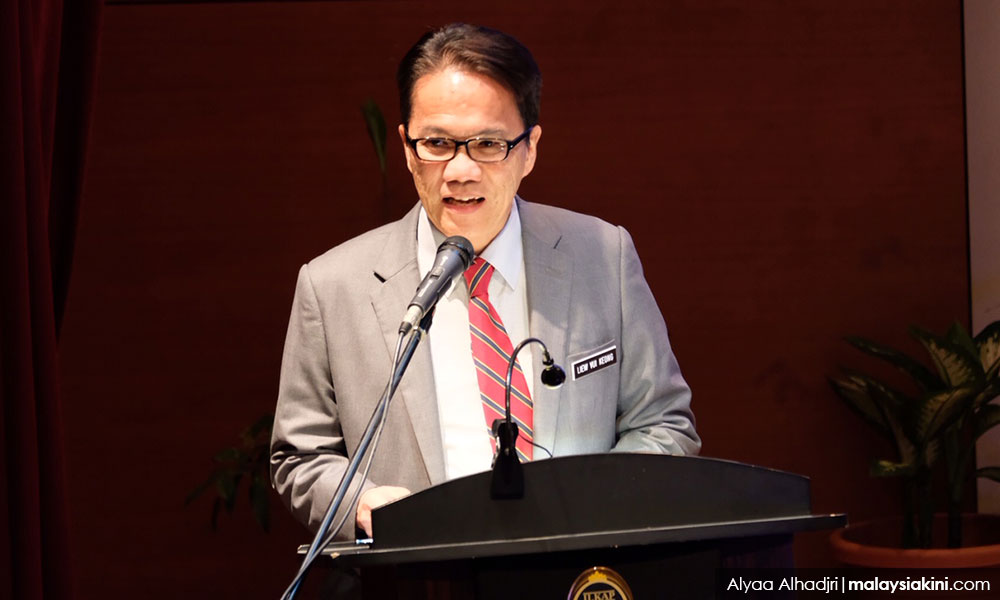
Having had a cousin murdered nearly 40 years ago, De facto Law Minister Liew Vui Keong said the question still persists over whether the death penalty for the offender would end their family's hurt.
Similarly, he noted that questions were raised on the effectiveness of the death penalty in bringing down overall crime rates, particularly murder and drug trafficking.
In his speech at the Judicial and Legal Training Institute (ILKAP) over the way forward for law reforms and the abolition of death penalty in Malaysia, Liew noted that there were mixed calls for retention and abolishment of capital punishment in Malaysia.
He said that the government had responded by repealing the mandatory element and substituting it with discretion in the hands of judges.
As for the way forward in terms of prison reforms, he said a possible improvement could be to reduce the number of drug-related offenders - currently making up some 55 per cent of 66,222 inmates nationwide - particularly addicts who require medical treatment.
"Our KPI as I kept telling my ministry officials cannot be an increase in arrests of people and sending them to prison. That is the wrong approach.
"Our approach should be to ensure our prison (population) will be on the decrease rate every year," said Liew who addressed ILKAP's staff as part of its Speaker Series 2019 in Bangi.
"If we can treat them, we don't want to imprison them.
"We want to give them medical treatment, help them," he said, adding that treating drug addicts as "patients" instead of criminals could indirectly help reduce society's stigma and promote family acceptance of their condition.
"They need help to cure their addiction," said Liew who noted a high rate of repeat offenders among drug addicts as they failed to get treatment or denied a chance by society to start a new life.
More than just a societal problem, Liew said the increasing number of prisoners every year is also a burden on the country's finances, with an estimated RM900 million spent on the current number of prisoners, at an average cost of RM40 per inmate per day.
"Can you imagine if we can reduce the prison population by 20,000 inmates multiplied by RM40, that would be RM800,000 saved a day, in 365 days that would come up to about RM300 million.
"With that saving that we have we can use that money to help all these drug addicts, give them medicine, and reduce social stigma," he said in urging ILKAP as an institution to deliberate on his suggestions and make recommendations to the government.
At a press conference later, Liew noted there were still issues surrounding discretionary powers for judges to deliver a death sentence, including under Section 39B of the Dangerous Drugs Act.
He said there were four conditions which must be fulfilled before a judge can exercise his discretion under the Act, including for the accused to have provided proof of assistance in police investigations to deter drug activities.
Liew cited the case of army veteran Amiruddin @ Nadarajan Abdullah or 'Dr Ganja' who is appealing a death row sentence delivered by a High Court for 36 charges under Section 39B of the DDA, as an example on restrictions for a judge to exercise discretion.
“He (Amiruddin) couldn't satisfy the last condition (proof of assistance to police) so he was sentenced to death by hanging," he added.
Quizzed on whether Putrajaya remains open to entirely abolishing the death penalty, Liew said he will continue to advocate for the idea despite the present decision to partly retain capital punishment.
As of Oct 28 last year, there are 1,281 death row inmates in Malaysia, 932 of whom were convicted of drug trafficking.
Those convicted of drug trafficking are frequently drug mules and addicts, not drug cartel leaders. - Mkini



No comments:
Post a Comment
Note: Only a member of this blog may post a comment.